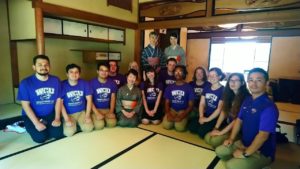When it comes to getting out of the country, everything seems to boil down to one simple fact: we all want to see the world, but we don’t have that kind of money. Except, as a Western Carolina student, maybe you do.
WCU Junior Julia Mata found a solution by spending a month abroad during the summer in Germany with the help of her financial aid.
“I still had to pay out of pocket,” said Mata. “For example, for the plane ticket and I think maybe $500 in down payment. But everything else was primarily taken by financial aid; if [it wasn’t], I couldn’t go.”

WCU Junior Julia Mata in Heidelberg, Germany, in June, 2019. Photo by Geneva Watson
Mata isn’t the only Western student using financial aid for opportunities to go abroad. Senior Richard Cortes went on a three-week trip with the Japanese department in May of 2019 on a faculty-led travel course to five major cities in Japan (Tokyo, Nagoya, Hiroshima, Naruto, and Kyoto). His entire trip was covered by financial aid, which ended up being around $5,500.
“The way financial aid works is you don’t get that money until [after] a couple weeks and you’re back from your trip,” said Cortes. “So it’ll cover the second half of the expenses, and it’ll pay you back for whatever you paid at the beginning. But the way it works is you have to pay at least the deposit and your flight ticket upfront.”
Financial aid covered transportation to housing to various activities for both Mata and Cortes.
For students looking for a summer travel opportunity, faculty-led programs may be a good option to consider. Different from study abroad programs, which typically last from a semester to a year, faculty-led programs last anywhere from one to eight weeks.
According to Jennifer Thomas, the Study Abroad Advisor at Western Carolina, 208 students went abroad on faculty-led trips during the 2018-19 school year, while 94 students studied abroad on individual programs. According to Thomas, single semester programs are the most popular nationwide.
“For study abroad, the most popular locations are Japan and the United Kingdom,” said Thomas. “Germany and Costa Rica were the most popular locations for faculty-led trips during 2018-2019.”
WCU offered 18 faculty-led programs to 11 different countries during the 2018-19 school year. While some of these programs have prior class and language requirements, others do not.
“We had one person who had never taken a Japanese class in her life,” said Cortes. “And she went with us.”
Faculty-led and other summer abroad programs can also work as stepping stones in more ways than one. While Mata’s initial program only lasted a month, she first arrived a week early in order to travel to Switzerland. After the program ended, she extended her visa in order to travel to the surrounding countries in Europe, all without costing an arm and a leg.

WCU students traveling with Professor Soichiro Motohashi enjoying the Tea Ceremony House at Chukyo University during the summer of 2019. Photo provided by Richard Cortes.
When it comes to traveling, Mata first advises that you start saving early.
“If you already have an idea that you want to go abroad, maybe try getting an extra job,” said Mata. “You’ll know you’ll want to spend as much as you can to be able to be involved in the experience of what you’re doing.”
But even if you still find yourself counting Franc or Yen coins overseas despite the fact that you saved up, she still offers some advice. Cook for yourself when you can, try local food stores and bakeries. When it comes to where to say, avoid hotels in favor of cheaper options like Airbnb’s or Hostels.
“I went to France. I was there for four days, and I stayed at an Airbnb,” said Mata. “That definitely helps to save money. Use Hostels, don’t forget about those places. Don’t go to hotels.”
WCU offers another opportunity to see the world with its study abroad programs. The Study Abroad Offices offer a number of programs to countries all around the world that can fit to almost any budget. For Mata, going on a summer trip was testing the waters for a potential study abroad year in Germany. Now that she’s gotten a taste of what it’s like, she can’t wait to go back.
“Being able to immerse yourself in a culture for just a summer isn’t enough, not even just for a month, I think,” said Mata. “When you go abroad and you get to see the world you really get to feel the connection you have with the world around you, and the people that you get to meet, and the lifelong connections you make, and so therefore when you’re involved in that experience, you want to go back for more.”
“While studying abroad students get the incredible experience of traveling the world while pursuing their academic, professional and personal goals,” said Thomas. “Often times our students are learning the language of their host country.”
Whether you want to see Paris for six weeks or live in Chile for a year, the Study Abroad Offices are ready and available to explain your options to you. Give it some more thought, send a few emails, and maybe this time next year, you’ll be telling your friends and family about your spectacular travels around the world.


